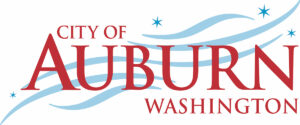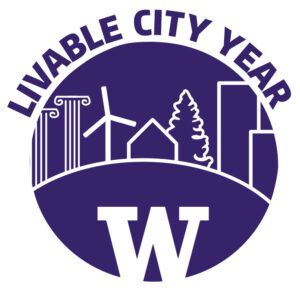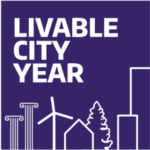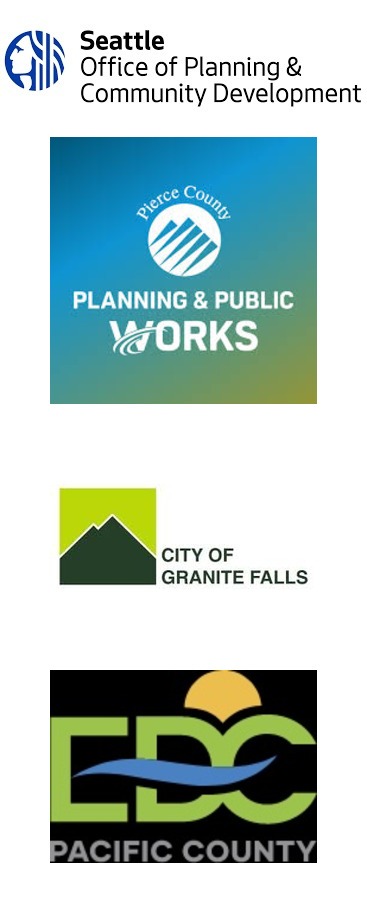Livable City Year: One year. One city. Dozens of UW faculty and hundreds of students.
Working together to catalyze livability.
Livable City Year partnered with the City of Auburn for the 2016-2017 academic year, connecting UW students and faculty with projects identified by Auburn that address the city’s sustainability and livability goals.
UW students worked on the following projects in the city of Auburn during the 2016–2017 Livable City Year.
Fall 2016
Comprehensive Plan Connectivity Element
Faculty: Branden Born
Course: Community, Environment & Planning
The purpose of a connectivity element is for the city to be more strategic in its efforts to physically, socially, culturally, and economically connect Auburn. This project includes a problem assessment, mapping exercise, and development of suggestions for code updates and infrastructure improvements for physical connectivity. The deliverable will be provided in a format resembling other already adopted elements of the comprehensive plan.
Placemaking Imagined by the Community
Branden Born
Course: Community, Environment & Planning
Auburn’s neighborhoods are quite distinct from each other. Residents may or may not associate themselves as from Auburn or as part of their neighborhood. This project will have students assess how communities see themselves, using mapping and a community survey to look across the whole city. This will allow for future connection to other LCY projects, and will include strategies for the city to increase local sense of place and Auburn-wide community identity.
The Buy Local Project: Connecting Auburn Residents and Local Businesses
Ashley Blazina
Course: Sustainability Studio – Socially Responsible and Equitable Purchasing
This multi-pronged project will enable Auburn’s residents and local businesses to connect with each other. Students will develop a website and mobile application to gain information about local businesses and buy products and services. The project will also include a marketing component, helping local businesses to better advertise to a wider audience.
Assessment of Policy Recommendations Made by the Mayor’s Task Force on Homelessness
Kyle Crowder
Course: The City
In November 2015, Mayor Nancy Backus convened Auburn’s task force on Homelessness. They developed a list of recommendations and consensus items on how to address the city’s current condition of homelessness that will be brought to the city council. The overarching purpose of this project is to engage students in assessing these recommendations and developing strategies for carrying them out.
Tools to Monitor Affordable Housing
Kyle Crowder
Course: The City
Auburn has identified a need to maintain its existing housing stock as a means to maintaining affordability and reducing pressure on resources. This project will engage students in the development of approaches and tools to monitor and maintain Auburn’s existing housing stock.
Methods for Counting Auburn’s Homeless Population
Kyle Crowder
Course: The City
The purpose of this project is to develop new analysis tools to assess the size, location, and change in Auburn’s homeless populations. Students will assess current practices and strategies used by Auburn and other municipalities, and describe potential new tools appropriate for Auburn.
Sewer Pipe Blockage and Potential Education Strategies
John Scott Meschke
Course: Water, Wastewater & Health
Improper disposable of fats, oils, and grease (FOG) and “flushable” cleaning wipes can cause clogging issues, and improper disposable of pharmaceuticals can cause downstream environmental issues. Greater amounts of FOG and rags have been identified downstream of large areas of rental housing than of single family residences. The aim of this project will be to determine possible strategies to educate these residents about the issues associated with improper disposal of FOG, “flushable” wipes, and pharmaceuticals.
Pet Waste and Water Quality
John Scott Meschke
Course: Water, Wastewater & Health
Pet waste has been identified as a likely source of high levels of fecal coliforms in a tributary to the White River. This tributary is downhill from a large residential area. The aim of this project will be to educate these residents about the issues associated with improper disposal of pet waste.
Community Profiles and Resident Engagement in Neighborhoods
India Ornelas
Course: Foundations of Health Behavior and Social Determinants of Health
This is part of a year-long engagement with this project. During the fall quarter, students will identify and summarize available data to help describe Auburn’s five neighborhoods. Students will conduct stakeholder interviews, and will identify aspects of shared identity and diversity. Students will create a community profile of each of Auburn’s five neighborhoods to support community engagement in Auburn.
Marketing and Awareness of City Values
Kim Perdue
HuskyCreative; American Marketing Association
The purpose of this project is to increase awareness of the city’s values – created from the “Imagine Auburn” project – both internally among government workers and externally among citizens. Through the implementation of the marketing plan a greater feeling of community will be created in Auburn.
Winter 2017
Storm Utility Low Impact Development Cost Analysis
Faculty: Sara Brostrom
Course: Sustainability Studio
Two groups of students will work on this project. One group of students will interview municipalities throughout Western Washington that currently use LID stormwater equipment and technology. From this, the students will create a report and presentation on the current LID maintenance cost, challenges and benefits. A second group will assess the maintenance, materials, labor force required, monitoring costs, maintenance timelines and other associated costs with LID stormwater equipment and technology.
Current Food Waste and Potential Food Rescue Programs for the Auburn School District
Faculty: Jennifer Otten
Course: School of Public Health Capstone
School cafeterias generate a significant amount of wasted food. An estimated 30 to 50 percent of edible food in schools is not eaten by students and is instead sent to landfills or composting facilities. The purpose of this project is to work with Auburn School District to gather and analyze data from schools in the Auburn School District on current cafeteria and kitchen solid waste to inform a pilot School Food Share Program and to help identify effective waste reduction strategies. Students will suggest actions schools could take to reduce and recycle overall waste, including wasted food, and will offer recommendations for what could be donated from schools as edible food products.
Livability Synthesis: Advancing the Connectivity Element and Community Placemaking Projects
Faculty: Branden Born
This course builds on the work of several fall quarter projects, including the Connectivity Element for Comprehensive Plan and Community Placemaking, and integrates, advances or deepens the findings of those projects.
Spring 2017
Little Alleyway, Big Activation
Course: Landscape Architecture Studio
Our project involves the redesign of the alley located between the Auburn Avenue Theater and Auburn Arts and Culture Center and the surrounding landscape area to provide the community with functional spaces that relates to the programmatic components of adjacent businesses. Envisioned is a revitalization action plan that would produce a model for public gathering, public art and other programmed uses and contribute to the revitalization of downtown Auburn.
How Prepared Are Auburn Residents for an Emergency?
Faculty: Amy Hagopian
This course will conduct a situation analysis of Auburn residents’ understanding of the risks of natural and man-made disasters, and propose policy and program interventions to improve disaster preparedness. Proposals will include policy and programs that address both individual and community-level components as well as best practices in relation to cultural competence.
Full Plates, Full Lives: Food Systems in a Growing Auburn
Faculty: Richard Conlin
Course: Neighborhood Planning and Community Development
This course is a hands-on introduction to neighborhood planning and community development, with a practical focus on conducting a neighborhood planning exercise in the City of Auburn. The exercise will respond to the Health Impact Assessment (HIA) conducted by the City of Auburn in 2014 which identifies the need to be proactive about providing healthy food options to residents. Class participants will do field work in the City of Auburn and will develop a set of materials that can be a neighborhood planning framework for implementing the strategic recommendations of the HIA and other strategies that may be developed to supplement them.





